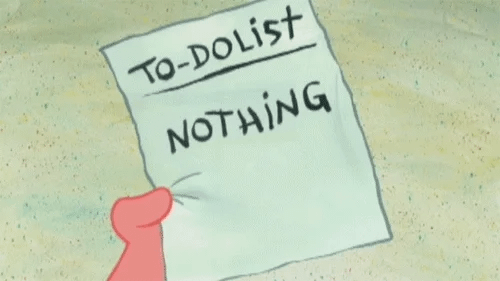The Myth of Laziness
For someone who’s supposedly lazy, you’re working really hard.
I left out a few things on the post about unhelpful life advice. Here’s one more: “Stop being lazy.”
This one is a little different from the other things. With “stop being lazy” (or “don’t be lazy,” or another variation), most of the time, no one else is saying it to us—WE are saying it to ourselves. Yet it’s just as unhelpful as telling someone they should “avoid distractions” and “focus more”!
In fact, I have a strong opinion: not only is this advice unhelpful, it’s also untrue.
Breaking news: YOU’RE NOT LAZY.
How can I be so confident? First, because you’re reading a post about self-improvement, i.e. making your life better. Most likely, you’ve read one of my books or other posts or something else I’ve written.
Even if not, you probably followed a link from someone else who shares on these topics. The point is, you’re somewhat interested. You don’t have to do this. You could waste time like everyone else does.
But you are deliberately choosing to engage with posts and stories about being better this year than the last.
Maybe you even identify with the description of my ideal reader:
You feel like there’s something you should be doing, but you’re not always sure what it is. You want to stop scrolling all the time. You want to find what matters and do more of it.
You are strong—and you struggle. These two points co-exist.
Also within you, a sense of insecurity causes you to second-guess yourself. You have ideas but don’t always follow-through.
You worry about what other people think of you. Then you get mad at yourself for worrying about it. But you still worry.
Sometimes you get stuck. You don’t feel like doing anything at all! You just want to give up and do whatever energy-depleting activities you gravitate toward.
Second, chances are, you have behaviors that might present as laziness, but underneath the surface, something else is going on.
Instead of being lazy, you struggle with executive functions (initiating tasks, planning, remembering things, etc.), not motivation.
You might be able to hyperfocus on some tasks, which is great—but it also leaves you feeling very tired and unable to tackle what seem like simple or easy tasks. This has nothing to do with being lazy. In fact, you could think of it like this:
For someone who’s lazy, you’re often working really hard!
This is especially common for those of us with ADHD, but we don’t have the behavior entirely to ourselves.
So this is what it comes down to: you want to do better—but it’s sometimes a struggle. And if you don’t learn how to manage this dynamic, you’ll never improve. So that’s what we need to work on!
You’re not lazy, so the solution isn’t “just work harder.” You need to work differently and from a new perspective. You need to learn new skills.
FACT #1: Laziness can be a form of learned helplessness.
At some point, you learned to be lazy (let’s just use the word for now, even though it’s not quite right) because you feel afraid or powerless.
In other words, laziness is a recognized sense of futility. It comes from a lack of agency, where you feel like nothing you do will matter. You can’t change circumstances, so why try?
Laziness can also be known as “output failure”: the inability to produce results or take action despite having the desire or intention to do so.1
FACT #2: Shame does not create change.
No one is shamed into effective change. So what is effective?
It starts with a change in motivation and a commitment to be better. Consider, without guilt, how YOU hold yourself back. Can you think of a specific circumstance?
Your self-compassion is not only an acknowledgement. It can help you move away from the things that are harming you.2
To be clear, I am not an expert in this matter. I too am learning it along the way. But understanding that you probably aren’t lazy, and that this pattern of behavior is a logical response to your environment, is a good start.
—
Conversation Starters
Do you ever feel energized but still struggle with doing things?
What are some more positive ways of describing “lazy”?
Are you ever able to “rally” from laziness? (If so, what happens?)
Something you’re looking forward to this week.
See: https://www.simonandschuster.com/books/The-Myth-of-Laziness/Mel-Levine/9780743213684
And also: “The Conception of Laziness and the Characterisation of Others as Lazy,” https://link.springer.com/article/10.1007/s42087-018-0018-6
We’ll discuss this more in a future post.




My desire to create output always outstrips the total amount of energy I have available, so I hit the wall of having an energy deficit.
This energy deficit manifests in over-doing inner work and then tripping my biological circuits, getting overloaded, and in IFS terms, having firefighter backlash.
My backlash = eating sugar or binge-watching as a means to soothe/numb/calm down my overloaded system.
I stay up late, don’t get enough sleep, and then end up in even more of an energetic hole the next day.
Ugh!
Every time I hit this negatively-reinforcing cycle, I ask myself, “How can I work smarter, not harder?”
I keep trying new approaches to accrue more energy so I don’t run a deficit.
I’ve noticed that ‘active’ healthy methods of increasing energy are out of reach once my tank is empty. I’m not going to meditate, do breathwork, yoga, or even take a walk when my entire nervous system is on fire.
Eating and binge-watching are PASSIVE. I need passive healthy energy sources when I’ve got nothing left.
If I were a millionaire, great sources of passive energy would be acupuncture, massage, reiki, sound healing— anything where I just lie down and RECEIVE. But lo! I’m not a millionaire and I honestly can’t afford to do those things as frequently as I run out of energy!
My new long-term solution is to invest in physical sources of energy I can access at home, any time, that create deep relaxation in the body. One solution: I’m buying a sauna! It’s a huge investment but in the long run, my vision is it will be my daily re-charge box. Here’s hoping!
Also, sometimes what you need is laziness.